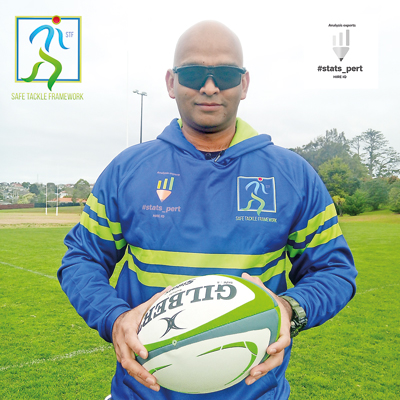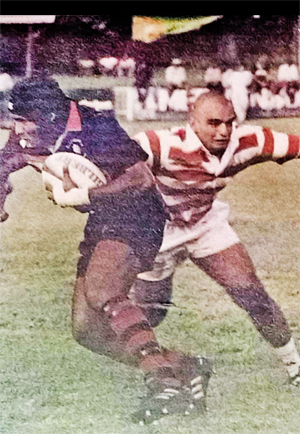STF: Game-changing tackling concept

Ravindu Athukorala is known as ‘Boa Athu’ in New Zealand
The bane of rugby in Sri Lanka is the sight of whistle-happy referees blowing at every opportunity especially for what they perceive as dangerous tackles. Rugby being a contact sport like boxing, clash of heads and bodies are inevitable as long as there is no deliberate intent of causing harm to your rival.
In May 2019 World Rugby unveiled a ‘Decision making Framework for High Tackles’ to be adhered by referees. Under Law 9.11, the referee is always entitled to issue a red or yellow card for anything that they deem to be reckless or dangerous. Guidelines were introduced to improve consistency in application of sanctions by distinguishing between dangerous tackles that warrant a penalty, yellow card or red card.
However, from the perspective of those engaged in the battle for high stakes, not least spectators who want their money’s worth of entertainment, these constant stoppages for the slightest infringement has been like an eye-sore. It is arguably one of the reasons which has drawn many spectators away from the domestic game in the recent past especially at club level in Sri Lanka. Coaches are also in a quandary because there is a very thin line between a solid tackle and a dangerous one.
Two Sri Lankan rugby stars based in New Zealand, Ravindu Athukorala and Niranjan Ranasinghe, have come up with an innovative concept to tackle this dilemma which could be a game-changer in the highly contentious issue of high tackles. After more than two and half years of tests, re-tests and changes, the Auckland-based coaches have drawn up ‘Safe Tackle Framework’ (STF) which will be trialled in a senior competition in New Zealand next season and hopefully, rolled out for an international competition and its implementation.

Athukorala tackling Shamly Nawaz in a CR vs CH game played in 1999
Former Royal and CH&FC flanker Athukorala is the architect of STF which is a safety-first and compliance-based tackle framework.
“If you make any contact with shoulders or above or make contact to the head, it’s a minimum yellow or red card. We spent about three years to see how we can simplify this. We want to make sure everyone stays legal while at the same time we don’t lose effectiveness in the tackle,” explained Athukorala who is simply known as ‘Boa Athu’ in New Zealand where he has been domiciled since 2002.
“For me the biggest driver was these yellow cards. They were sanitising the game. Rugby is a contact sport. People will get hurt. You are going to get a few broken bones. You might get a few knocks,” said Athukorala, a crash-tackling flanker who was member of the record-setting Royal Bradby side of 1998 and league champions CH&FC in 2000. “One attraction to rugby is the contact. People like to see big hits. My biggest issue was good big solid hits and tackles were being unfairly penalised because of this softening of the game. So rather than just complain of yellow cards and penalties as a coach I wanted to do something different. That was the main focus behind Safe Tackle Framework,” said Athukorala, 41, who is Director of Rugby at Manukau Rovers RFC which will be celebrating 125 years in 2021 and is home of some great All Blacks such as Frank Bunce.
“When you talk to rugby people, the number one complain they have is penalties and referees’ decisions on the field. Yellow cards are a major problem. Even if you sneeze wrong they will give a yellow card,” he quipped.
“We as coaches have to start coaching our players in a manner where they can stay compliant, legal and not disadvantage you because your tackle technique is not correct. It took us a good two and half years to develop this. We are almost at that stage where it will get rolled out,” said Athukorala, a World Rugby Level 3 qualified coach who aims to sit for the Educator course next year.
“One of the biggest problems facing rugby is child player participation because parents are worried that these kids will get hurt and get concussed. Concussion is a big problem. As coaches we have to prepare players to be safe. Think about it. If we teach our players to tackle at a safe height, as they grow older and when they come into senior rugby, you won’t have this problem of high tackles,” he explained.
“But you have to start somewhere. It’s like any habit. If a child picks up a bad habit when they grow up it will become very difficult to get rid of. Plastic bags were banned in New Zealand three years ago and my children who are growing up will never know what a plastic bag is,” he pointed out.
“Simple philosophy we have behind STF. We teach children to progress with the age grade in a safe manner. That’s it. Very, very simple. At the moment there are laws. It’s called the nipple line. Anything above that will be penalised or carded. Because referees are being so pedantic on this we are actually penalising good tackles based on the severity of the contact. All of a sudden people start looking at you in a different way. It’s counter-productive to tackle hard. What we want is for players to tackle hard but tackle in a safe manner, not try to take someone’s head off,” explained Athukorala who handled juniors grades at Roskill districts in Auckland early coaching career and Grammar Carlton at senior grades.
Drawing an analogy between a driver who broke speed limits and the main cause of dangerous tackles in rugby, he said: “When you are driving a car and if there is a number on the road saying 100, you have to stay below that. But the reality is there are enough and more people who will break the law. It is no different with tackles. Everyone knows you can’t tackle players above the shoulders. But there are enough and more tackles which will make contact with the head. So, we have to go back and look at why that is happening. Are we doing something wrong as coaches and players, and if we are doing something wrong how do we correct that,” he said.
It all boils down to coaching technique and education, he says. “You have to educate people. For that you have to simplify things. You can’t complicate things. In a match mistakes start to happen when people get tired. Then they start doing silly things like putting high shots or punching someone. It’s human nature. It’s the same in rugby or anything,” he said.
“Nira (Niranjan Ranasinghe) and I as coaches, we have understood that. We did a lot of testing, re-testing, spoke to a lot of coaches, got a lot of feedback from players, referees. It’s a framework which helps everybody including spectators because the biggest disadvantage group in rugby are actually the spectators. If you keep penalising teams, there is no flow to the game and also it’s too confusing. There are some penalties which are blown which are very confusing. I have studied rugby pretty much all my adult and junior life. Even I can’t understand why some penalties are given. So you have to simplify it,” said Boa Athu, 41, a graduate in International Business from the Auckland University who took up coaching early in his career.
“As rugby coaches if we are not happy with something, we can’t just sit back and wait. We have to actually go and do something to address the situation. We have to innovate. That is what Nira and I have done. We did not sit back and wait. We thought if we do what everyone else does, we will get the same result. So we have to go out and do something different to change the result. That result is the STF and doors which have opened,” he said.
“I am very grateful we live in a country where you are judged on your ability and skills. When the Union (New Zealand) saw value in what we were doing to make the game safer, they were very receptive. There is a good lesson to be learnt there. If you have something which is simple, it is easy to understand. Over here the higher the level we go, we try to simplify things more. Then it’s very easy to understand and execute. That is probably one key reason why New Zealand rugby is so good. The All Blacks do very simple things but they do it really well. They do basics so well it looks like magic but it’s actually real simple stuff. This was part of Nira’s Level 3 coaching project as well. We have a lot of support from our peers, fellow coaching staff in Auckland. It’s a very enjoyable and interesting experience,” said Athukorala.


